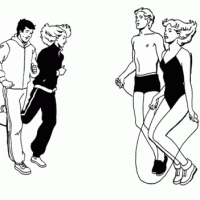So! Why Am I Not Losing Weight?
If the foregoing scenario sounds familiar despair not for you are not alone. Also, don't be discouraged because there are some answers to your problems. Read on.
If your are troubled by this frustrating, routinely recommended "diet and exercise" system and find that you also tend to gain all of your shed kilograms / pounds back every time you digress from your program you are likely among the 75+% of the population who have not been controlling your Insulin levels.
The Heller's of "The Carbohydrate Addicts Diet" fame would call you an addict. Some would call you Insulin resistant and others would call you "Pre-Diabetic". It doesn't matter what your condition is called, the reality is, you are likely not controlling your insulin levels.
North Americans are eating less fat than ever recorded in history and yet they are gaining weight to a point where the World Health Organization has called it an epidemic. We also have a Type II Diabetes epidemic in progress and a new case is diagnosed every 8 1/2 minutes in Canada. Type II Diabetes is the condition where you produce enough or a lot of insulin but appear to be resistant to its proper utilization - it is know as Non Insulin Dependant Diabetes or Adult Onset Diabetes)
The form of Diabetes is totally controllable by diet although few choose that route. Most Type II Diabetics gain weight because the excess insulin (the storage hormone) prevents the mobilization of free fatty acids to be burned for energy.
Could the problem be that the "Politically Correct" diet recommendations are in fact less than correct for the majority. Scientific publications contain a wealth of documentation demonstrating that excess insulin may be the culprit responsible for excess weight gain. Dr. Norman Kaplan, author of the medical text book "Clinical Hypertension" states "most overweight people are hyper-insulinemic" (too much insulin in the bloodstream). Dr. Calvin Ezrin, professor of endocrinology at UCLA and author of "The Endocrine Control Diet and its second edition - The Type II Diabetics Diet" outlines very clearly the research on hyperinsulinemia and its many negative effects on human health.
Insulin, the famous storage hormone secreted by the pancreas in response to elevated blood sugar, might be dubbed the Good guy / Bad guy. You can't live without it, just ask any Type I Diabetic but too much causes a virtual smorgasbord (pardon the pun) of problems.
Problems like :
- Frequent hunger
- Fat storage
- Sodium retention - leading to fluid retention and hypertension
- Essential Fatty Acid Metabolic interference leading to hormonal imbalances and inflammatory conditions
- Elevated cholesterol and triglycerides
- Prostate growth.
Excess insulin is the result of either a condition of insulin resistance or from an over sensitized pancreas which over produces insulin in the presence of rapidly rising blood sugar. Regardless of the cause the ONLY SOLUTION is to control the amount of blood sugar and the rate at which blood sugar rises.
So to answer the question posed in the title: Because you are not controlling your blood insulin levels.
The only way to control blood insulin levels is through careful and responsible selection of carbohydrate sources and to exercise. Exercise does reduce insulin levels but only for about two hours (less if you follow your exercise with a high carbohydrate drink or snack which is a good idea to speed recovery following exhaustive exercise - not a good idea following moderate aerobic exercise designed to help you burn Calories and lose weight).
I have found the least painful and healthiest way for dietary control of insulin is to follow a food selection program of 40% carbohydrate, 30% protein and 30% fat. (Remember that even the American Heart Association does not endorse fat intakes below 30%). This plan has been dubbed the 40-30-30 plan as opposed to the typical dietary habits and recommendation of 60-15-25 or 55-15-30 or the athletes diet of 60-20-20. A few simple rules need to followed in a 40-30-30 eating plan (which is not a short term "diet" but rather a responsible lifestyle choice):
- Eat protein in every meal and every snack - no exceptions.
- Eat some of your protein and fat first to control the rate of blood sugar Elevation.
- Choose low Glycemic Index (raise blood sugar slowly) vegetable and fruit as your main sources of carbohydrates. They have higher nutritional density per Calorie and more fibre. Minimize pop, juice, dried fruit, bananas, root vegetables, and corn.
- Choose fewer grain products as your carbohydrate choices and always use the most unprocessed versions.
- Essential Fatty Acids (EFAs) and high quality proteins are the "spark plugs to metabolism" choose them wisely. Be sure there are some EFAs in every meal.
- Food Supplementation is not an option for enduring good health. It is a necessity.
- Start with a complete and reputable Multi Vitamin and some EFAs like Omega 3 and GLA.
Good choice examples
Breakfast: 2 eggs, 1/2 cup plain yogurt, 1 slice whole grain bread, 1cup strawberries and 1 Tbsp of slivered almonds (adds good fat).
Lunch: 4 oz. grilled chicken, 2 cups of lettuce, 1/4 cup each of onions, mushrooms and tomatoes, some spices of choice with 2 Tbsp of Oil and vinegar dressing and an orange for desert.
Dinner: 5 1/2 oz. fish fillets, and 1/2 oz of shredded cheese ; 1 cup chopped spinach salad with onion, red pepper and lemon juice and 2 Tbsp of oil and vinegar dressing. 1/2 a pear for desert.
2 snacks for the day could include : 1/2 cup of plain yogurt or 1 oz of cheddar cheese and 1/2 an apple, or 1 cup of 1% milk and 4-6 almonds or 1 oz of soft cheese and 1 cup V-8 juice
I don't count Calories in this program, I only offer them here as a frame of reference. Your nutritional choices are far more important than the number of Calories. High quality diets are automatically lower in Calories because it is easier to supply the nutrient demands. This would be approximately a 1300 Calorie day and I can assure you will not feel hungry, You will have lots of energy and you will lose weight if you need to.
- Prev:The 3 Hour Diet
- Next:Looking To Lose Some Weight?
Related Articles
-
How to Burn Fat: Doctors Proven Weight Loss Secret #1
Let me ask you a personal question. As you read thes
-
How To Speed Up Your Metabolism
The fastest way to lose our ugly body fat is to speed up our metabolis
-
Power Pops
Power Pops are diet lollipops that not only increase yo
-
Propolene Weight Control
Propolene weight control is one of many tools that may
-
Every Other Day Diet Honest And Comprehensive Review
Every Other Day Diet Review : The Every Other Day Diet program is desi
-
21 Day Diet Sweeping The Nation
Each year, a new crop of fad diets is introduced to the public. Most o
- DON'T MISS
- Fat Burning Furnace Review - Best Weight Loss Plan
- Is Lap Band Too Risky?
- Reduce Tummy Fat with Simple Stomach Exercises
- Garcinia Cambogia - an Effective Way to Lose Weight
- Fat Burning Furnace - Never Try a Crash Diet Again with This Easy, Proven System!
- Realistic Goals
- Fat Burning Furnace - The Only Single Proven System You Need to Make Your Dream Body Become Reality!
- Shed those extra pounds in a healthy manner with weight loss dieting tips
- Try a Workout with Kettlebells for awesome results
- Increase Endurance




